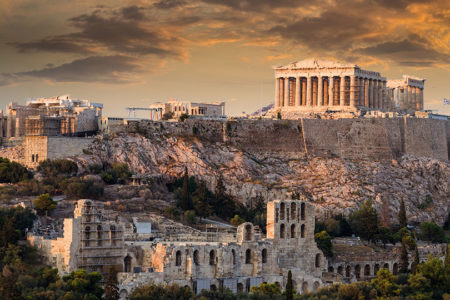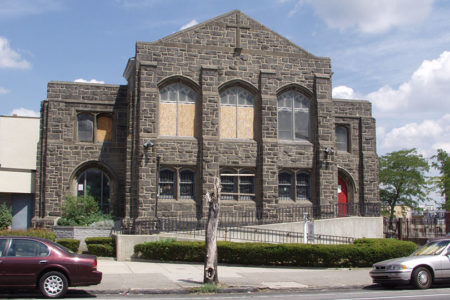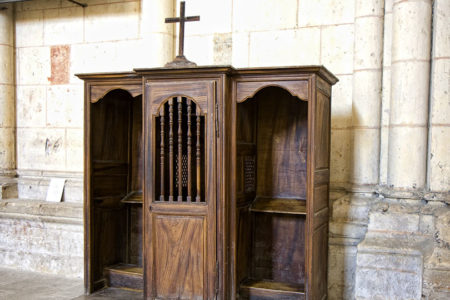A Future Hope for Israel
Micah 4:1-13
Many questions must have troubled King Hezekiah and the leaders of Judah when they heard Micah preach of the nation’s impending demise. After all, if Judah were destroyed, how would God fulfill the irrevocable promises He made to the children of Israel in the Abrahamic and Davidic Covenants?
In this chapter, God gives the people of Judah hope and assurance. He has not forgotten His promises to their forefathers. Although Judah will be destroyed, God will again redeem a remnant from under the iron heel of Gentile oppression and reestablish the nation in its promised land. This event will take place when the Messiah comes to rule the world from David’s throne.
Renewal
Micah shifted abruptly from his predictions of doom to give Judah hope of renewal “in the last days” (v. 1). The phrase the last days refers to the time when Jewish people will undergo great tribulation, followed by Christ’s Second Coming to restore the nation and establish Jerusalem as the center of His divine rule on Earth. Moses had prophesied this tribulation and restoration before Israel entered Canaan (Dt. 4:30).
Micah’s prophecy includes six predictions affecting Israel. First, “the mountain of the house of the LORD shall be established in the top of the mountains, and it shall be exalted above the hills” (v. 1). The mountains surrounding Jerusalem are higher than Mount Moriah, where the Temple once stood. At Messiah’s return all the mountains surrounding Jerusalem will be flattened (Zech. 14:4). Jerusalem, as well as the Temple Mount, will become elevated above the surrounding area.
Second, Israel and the nations of the world will worship in Jerusalem, “and people shall flow unto it. And many nations shall come, and say, Come, and let us go up to the mountain of the LORD, and to the house of the God of Jacob” (vv. 1–2). During the Millennial Kingdom, all roads will lead to Israel as people from the nations of the world encourage one another to go up to worship in Jerusalem at the Millennial Temple.
Third, saved Gentiles the world over will be taught by the Lord at the Temple in Jerusalem: “And he will teach us of his ways, and we will walk in his paths; for the law shall go forth from Zion, and the word of the LORD from Jerusalem” (v. 2). Revelation on how to live a righteous life and keep the Lord’s commandments will be provided to a new generation.
Fourth, nations will bring their disputes to Jerusalem for the Lord to arbitrate:
And he shall judge among many people, and rebuke strong nations afar off; and they shall beat their swords into plowshares, and their spears into pruning hooks; nation shall not lift up a sword against nation, neither shall they learn war any more (v. 3).
The Lord will settle all disputes, war will be eliminated, and this difficult and grasping world will finally know true peace. Nations will turn their weapons into farm implements and will cease teaching their people the strategies of war.
Fifth, with the elimination of war, nations will live in safety and security. “Every man [shall sit] under his vine and under his fig tree, and none shall make them afraid” (v. 4). During King Solomon’s reign, the words vine and fig tree were associated with peace, plenty, and prosperity (1 Ki. 4:25). The same will be true during the Millennial Kingdom because “the mouth of the LORD of hosts hath spoken it” (v. 4). No one will need fear an aggressive act from his neighbor because the Lord God Almighty, the omnipotent head of the armies of heaven, has guaranteed peace.
Sixth, idolatry will be gone. “For all people will (literally, “now”) walk every one in the name of his god, and we will walk in the name of the LORD, our God, forever and ever” (v. 5). In Micah’s day, all heathen nations ordered their lifestyles and religious beliefs after false gods. But a godly remnant in Judah ordered its conduct according to the Lord. In the future Kingdom, Judah will continue to put total trust in the Lord, while the nations of the world will put away their heathen gods and follow the Lord.
Regathering
In that day, saith the LORD, will I assemble her that is lame, and I will gather her that is driven out, and her that I have afflicted; And I will make her that was lame a remnant, and her that was cast far off a strong nation; and the LORD shall reign over them in Mount Zion from henceforth, even forever (vv. 6–7).
The prophet did not say when this prophecy will be fulfilled. The “remnant” cannot refer to the Jewish people who returned from the Babylonian Captivity because the Lord did not reign over Judah “forever.” The words in that day must refer to the Millennium, when the Messiah will rule over Israel forever. The remnant of Israel that will be restored is compared to a flock of sheep that were “lame” (footsore), sick, afflicted, and dispersed—a picture of Israel’s condition during the Great Tribulation. Afterward, at the beginning of the Millennium, God will regenerate and restore one-third of the previous Jewish population—all who survive the Great Tribulation (Zech. 13:9). When the Messiah returns, this remnant will have the veil of unbelief lifted from its eyes and come to salvation (Zech. 12:10; Rom. 11:26).
In keeping with the metaphor of sheep, Micah used a circumlocution to express Jerusalem’s elevation when the Messiah comes to rule during the Millennium: “And thou, O tower of the flock, the stronghold (Heb., Ophel) of the daughter of Zion, unto thee shall it come, even the first dominion; the kingdom shall come to the daughter of Jerusalem” (v. 8).
The phrase O tower of the flock, the stronghold [Ophel] of the daughter of Zion refers to the southernmost section of the Temple Mount, opposite Zion, separated by the Tyropoeon Valley. The words tower and Ophelare used synonymously of the strongholds in the city of David, later fortified by Jotham and Manasseh (2 Chr. 27:3; 33:14). It was the place where David’s palace once stood and where the king’s men stood as watchmen over the people of Jerusalem. When the Messiah returns to Jerusalem, He will restore the daughter of Zion to her “first [former] dominion” (v. 8) and guarantee the nation of Israel protection, peace, political power, and prosperity. The picture is reminiscent of the Davidic and Solomonic Empires, which were strong, stable, and impervious to attacks from other nations. This prophecy gave hope to a nation that would soon suffer the pain of destruction and captivity.
Redemption
Micah abruptly switched tracks to predict again the destruction and captivity of Judah. The prophet asked three rhetorical questions concerning the time of the Babylonian siege: “Now why dost thou cry out aloud? Is there no king in thee? Is thy counselor perished? For pangs have taken thee, like a woman in travail” (v. 9). In other words, why did great wailing break out in Judah? Did they not have a king and counselor to call on for help during the Babylon threat? Yes, they had kings; but the kings were powerless to lead the nation or counsel it during the Babylonian siege. Jehoiakim and Zedekiah each reigned when Babylon occupied Judah; but both served Nebuchadnezzar, king of Babylon (2 Ki. 24—25).
After Babylon destroyed Judah, the children of Israel were left without a king; and they will remain so until the time of their redemption (Hos. 3:4–5). Without leadership, pain and agony would grip the nation as birth pangs grip women in labor. Although the reference is to the Babylonian Captivity, the situation will be the same during “the time of Jacob’s trouble” (Jer. 30:5–7; Rev. 12), the Great Tribulation.
Micah continued:
Be in pain, and labor to bring forth, O daughter of Zion, like a woman in travail; for now shalt thou go forth out of the city, and thou shalt dwell in the field, and thou shalt go even to Babylon; there shalt thou be delivered; there the LORD shall redeem thee from the hand of thine enemies (v. 10).
Judah’s captivity is pictured in stages. As the people of Judah are compelled to leave the city for captivity, they will cry out in panic like a woman suffering agonizing birth pains. On the forced march to Babylon, they will be made to “dwell in the field,” unprotected from the elements and predators. Multitudes will perish. After arriving at Babylon, the Judean remnant will be in captivity for seventy years (Jer. 25:11). And at the end of seventy years, a remnant will be redeemed, or allowed to return to Judah. This latter prophecy was fulfilled by edict of Persia’s King Cyrus in 538 B.C. (Ezra 1:2–4). Micah’s naming of Babylon is an amazing prediction in itself, for it came more than a hundred years before all of Judah ended up there (Isa. 39:1–8).
In the future, heathen armies will trample Jerusalem’s holy sites without pity: “Now also many nations are gathered against thee, that say, Let her be defiled, and let our eye look upon Zion” (v. 11). The world will gloat with glee over Israel’s shame, suffering, and subjugation (cf. Dt. 28:37). This prophecy’s ultimate fulfillment will come during the Great Tribulation.
Someday the nations will storm against Jerusalem, ignorant of what God has planned for them: “But they know not the thoughts of the LORD, neither understand they his counsel; for he shall gather them as the sheaves into the floor” (v. 12). As sheaves are bundled and brought to the threshing floor to be trodden under the feet of oxen, so the nations that come against Israel will be destroyed. The annihilation they had planned for Israel will come on their own heads, especially during the Tribulation.
In verse 13 God directs Jerusalem to rise up and tread on her enemies as an ox treads out grain with his hoof. A horn of iron and hoofs of bronze symbolize the power and strength the Lord will give Israel to fight her enemies. This event likely takes place when the Messiah comes to destroy the nations at the Battle of Armageddon (Rev. 16:16; 19:19). Then Israel will gather the wealth of the world and devote it to the Lord, whose power will have accomplished the victory. The phrase unto the Lord of the whole earth refers to the Messiah (Christ) when He returns as “KING OF KINGS, AND LORD OF LORDS” (Rev. 19:16; cf. Ps. 2:8–9).
Micah prophesied a message of hope to the household of Judah. But before this hope is realized, Judah must be punished for her disobedience to the Lord. In the future, Israel will experience a glorious victory over her enemies and enjoy redemption through her Messiah. Then Jerusalem will be exalted as the capital of the world.






